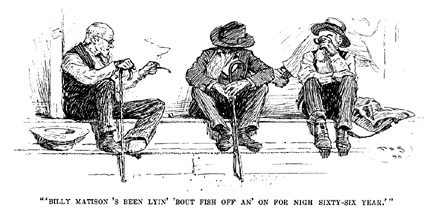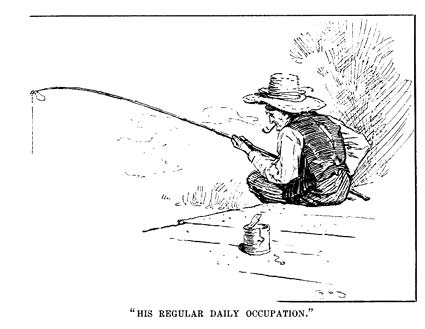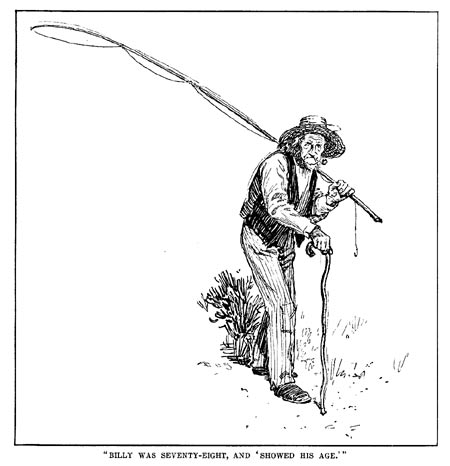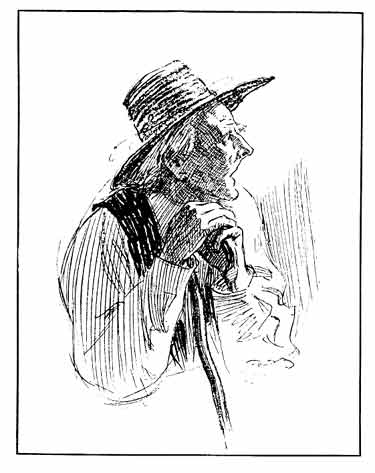from Century Magazine
The Reformation of Uncle Billy
by Ellis Parker Butler
"Lyin' is lyin', be it about fish or money," remarked the deacon, dogmatically, "an' is forbid by Scripter, an' he can't be saved an' freed from sin till he does stop lyin'. That's all there is to it. Billy Matison's got to give up fish-lyin', or he won't never git into the kingdom."

"Well, I reckon you're right, deacon," said Ephraim; "but it ought to be some excuse for Billy that he don't harm no one by his lyin'. Seems to me a lie ain't rightly a lie unless it ketches somebody. Ef you lie about a hoss you're tradin', I'll admit that's wrong, 'cause you'd do the other feller dirt; but Billy's lyin' don't fool nobody, an' it don't cost nobody nothin'. An' then you'd ought to be easy on him, seein' how long he's been at it. Why, Billy Matison's been lyin' 'bout fish off an' on for nigh sixty-six year, an' reg'lar, summer an' winter, for the hull time, at that. Now I leave it to you, deacon; it ain't easy to break off short."
They were sitting in front of the grocery. All were gray-haired men nearing the end of their lives, and all were members of the First Church. So was Billy, but his one sin cast a doubt in the minds of his friends regarding his salvation. Billy did not worry in the least. His regular daily occupation was to fish from the bridge across the river, and there he would sit day after day, catching nothing, or at least very little. But in the evening, among his cronies before the grocery, he told marvelous tales of the fish he had almost landed, of the big bass he had caught; and when the fishing season ended, and the rendezvous was the stove in the grocery, all these tales were retold, while it was observed that they had grown strangely during their period of desuetude.
Billy was such a genial, whole-souled liar about his fish that no one had ever had the heart to suggest the improbability of his tales; but a revival had taken place in the village, and under the fervid words of the evangelist the old men had been brought to a full realization of not only their own, but Billy's sins; and the deacon had resolved that Billy must be saved in spite of himself.
"No," admitted the deacon; "it ain't easy to break off short, but it's got to be done. Billy's got to be saved. We know his sin, ef he don't, an' knowin' a sin an' not doin' our best to stop it 'mounts to the same as ef it was our sin, an' I ain't goin' to everlastin' fire jest because Billy Matison lies about the fish he don't ketch."
"That sentiment does you proud, deacon," said Hiram, a weak-eyed old man with a thin white goatee; "you do yourself proud. That's lovin' your neighbor as yourself."
The deacon felt the delicate flattery, and puffed his pipe in silence a moment, lest he seem puffed up by the compliment.
"Billy Matison has got to be brung up short," he said, at length; "he's gittin' old, an' no tellin' when be will drop off. He's got to be cured now an' at once."
Ephraim had been thoughtfully pushing killikinick into his brier with his thumb. He struck a match on his trousers and puffed the tobacco into a glow.
The deacon opened his mouth again. "Billy Matison has --" he said.
"It's a pity," said Ephraim, interrupting him, "we can't let him break off gradual. When you come to think how long Billy has told fish lies, it seems like the shock of quittin' right sudden might be too much for him -- might make him sick, or kill him, mebby. Now, if he could sort o' taper off like, -- say, ketch one less fish a day for a week, or drop off half an inch a day from the size, -- it might let him down easy an' not try his constitution so bad."
"It would be easier on Billy," said Hiram.
The deacon thought deeply for a minute.
"Jest so," he said; "mebby it might strain him to give up all his lyin' at one time, seein' he takes so much pride in it, an' mebby we ought to be a leetle easy on him. Ef Billy Matison was a young feller it would be best, but we can't risk his dyin' unsaved. No; we got to git him to give it up right now. Now is the app'inted time."

"It'll be mortal hard on Billy, come winter" said Amos. "I 'low Billy won't know how to spend the winter ef he can't lie some."
Hiram shook his head sadly.
"I doubt," he said, "ef Billy can live out the winter ef he don't lie. Fish-lyin''s got to be all he does winters."
The deacon had been thinking again, and did not catch this remark.
"There's one p'int we must be careful on," he said: "Billy's almighty touchy, an' we mustn't let on we think he's lyin'. You know how touchy he is, Hiram."
"Thasso," said Hiram. "We can't let on we think he's lyin', he's so dum touchy. Ef we let on he was lyin', an' that we knew he was lyin', he 'd go off mad an' never come nigh us."
"An' then we would have a harder job, a big sight, to cure him," said the deacon.
"But I don't see how we can git at him airy other way," said Amos, "for ef we don't let on we know he's lyin' we can't tell him not to lie no more."
"They's jest one way to do it," said the deacon, "an' that's the way it's got to be did. We got to make him take back what he lies. Ef he lies an' says he caught a big one, we got to make him tell the truth, an' we got to do it gentle, an' not let on he's lyin'. We got to --"
Here the conversation paused, for around the livery-stable corner came Billy Matison, his fishing-pole slung over his shoulder, his bait and lunch-basket slung on the pole, and his cane in his hand. As he approached the group of old men, Billy did not appear a very energetic fisherman. His back was bent far forward, and his hand trembled as it held the pole. His cane was a necessity, and not an ornament. His wrinkled face was small, and appeared still smaller under the great homemade straw hat that rested on his long gray hair. He was an inoffensive, pale-eyed old man, and his toothless gums grasped a blackened clay pipe. Water stood in his eyes. Billy was seventy-eight, and "showed his age."
As he neared the group of old men, they arose. They were but little younger than Billy, and leaned on their canes for support.
The straightest of them did not assume the perpendicular at once, but opened gradually from his stooping position, as if his joints had long had the rust of rheumatism.
Billy tottered up to them, unsuspicious of their plot for the safety of his soul. When he reached them, he tremblingly swung his pole and basket to the walk, and sank on the plank bench with a sigh of relief.
Then he took his pipe from his mouth, and holding it out in his shaking hand for emphasis, said in his wavering voice:
"Deacon, I ketched the biggest bass I ever see today. I'll warrant it goes four pound."
Amos glanced at Hiram with pity in his eyes. Of all Billy's lies this was the greatest. But the deacon seated himself beside the fisherman, and putting one hand on Billy's shoulder, said:
"Billy, you an' me has knowed each other forty year, an' in all them years we been good friends, ain't we?"

Billy turned slowly and gazed at the deacon. His lower jaw dropped weakly, as was its wont when he was surprised. Words failed him.
"Ain't we?" insisted the deacon.
Billy replaced his pipe between his lips, and said simply, "Yes."
"An' you recollect how I helped you when you was courtin' 'Manthy? You'd never 'a' got her but for me, Billy. "
Billy's head shook a slow negative.
"An' how I lent you money to build a new house when yourn burned?"
Billy nodded. His eyes sought the faces of the group, but they were stern, and he could fathom nothing there.
"Billy," continued the deacon, "I'm goin' to ask a favor of you. It ain't much. Won't you say that mebby that bass only weighs three pounds an' a half?"
"Well, mebby it does," Billy admitted.
"Well, won't you say three pounds?"
"That bass --" began Billy, but the deacon interrupted him:
"For old friendship's sake, Billy. It's a special favor."
A few more lines gathered in Billy's brow, but he nodded.
"Billy," said the deacon, "you remember the night I brought your boy Jim home when he got lost? Can't you make it two pounds for that?"
Billy gazed doggedly at the plank walk. It was a hard struggle, but he nodded.
"You remember Gettysburg, Billy, an' how I carried you two mile? Can't you make it one pound for Gettysburg?"
Billy got up. He was trembling with something besides age now. It was anger.
"Deacon, you mean I'm lyin'--"
"No, Billy," said the deacon, soothingly; "I don't. Mebby me an' Hiram's got a bet up, Gettysburg, Billy! Make it a pound for me an' Gettysburg."
Billy leaned on his stick with both hands.
"It's -- a -- pound," he said.
"An' now, Billy," said the deacon, laying his hand on Billy's arm, while the old men gathered closer about him, "you remember when your Mary Ann went -- when she -- she left home, an' you -- when she visited us until you wanted her back? For that, Billy, won't you make it no fish at all? Won't you say you didn't ketch no fish at all today, Billy?"
Billy straightened up, and two large drops rolled from his eyes down the gutters of his cheeks.
"Deacon," he said, "I wouldn't do it for no one but you, but for you an' Mary Ann I didn't ketch no fish today."
For only one moment the deacon stood triumphant. Then each of the old men grasped Billy's hand firmly, and trudged away, leaving Billy alone, wrapped up in his thoughts. The deacon and Hiram went away together, and the deacon said, "Hiram, it's begun." That was enough.
And Billy! Half stunned, he stood gazing after them. He knew it all. He knew these old friends of his thought him a liar, and that they were trying to save him. Perhaps he should not have yielded, but the deacon had certainly been his best friend, and --
A known liar! A notorious liar!
He picked up his basket with a sigh and slipped it from the pole. Then he painfully mounted the two steps into the grocery.
"Billings," he said, as he placed the basket on the counter and raised the lid, "I ketched a big bass today; want you to weigh it."
Billings took the fish from the basket and dropped it into the tin scoop, where it felt with a slap. He pushed the weight along until the beam swayed evenly.
"Four pound, two ounces," he said.
